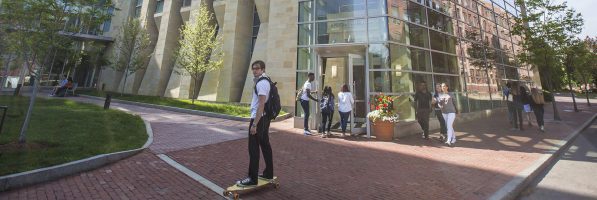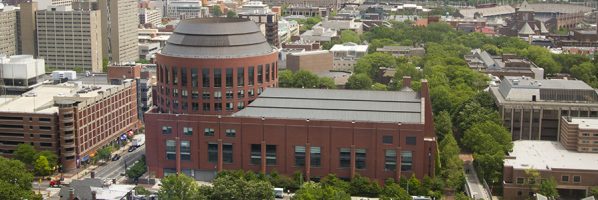Top MBA Recruiters: Deutsche Bank

Deutsche Bank, the 15th-largest bank in the world, oversees $1.6 trillion in total assets, operates offices in 58 countries, and employs more than 91,000 employees. And, of course, that means a lot of Deutsche Bank career opportunities for MBA students and graduates.
Given its stellar reputation for international investment and strong position in the global financial market, Deutsche Bank has long been a desirable destination for MBA graduates. Although Deutsche Bank has not always been in the news for the most honorable reasons, right now is actually an excellent time for MBAs to join the company.
How To Create Your Own Internship, and More – Boston News

Let’s explore some of the most interesting stories that have emerged from Boston business schools this week.
How to Land an Internship That Doesn’t Exist Yet – D’Amore-McKim Blog
The D’Amore-McKim School of Business at Northeastern University recently published an account of how Matheus Dos Santos, DMSB ’19 created his own internship at Brazilian bank branch Banco Bradesco.
Dos Santos, a Brazilian native, sought out an internship at Banco Bradesco as an opportunity to “learn more about the industry” while he spent his summer back home in between his first and second years at D’Amore-McKim.
Dos Santos reports, “When I was talking to them about a summer job, they didn’t have any process in place. They weren’t sure at first how to hire me formally, and since I’ve started, all sorts of people have come up to me to say that I’m the first one the bank has hired for this kind of position.”

AP Photo via Victor R. Caivano
Dos Santos helped Banco Bradesco “develop an online trading platform to reach millennials.” Edilson Fontenele, head of customer experience at Bradesco and Dos Santos’ supervisor, writes that Dos Santos’ appeal was his unique perspective as a “millennial who knows the Brazilian environment and also had exposure to international markets.”
You can read the full article here.
The Big Leap – Sawyer Business Blog
Sawyer Business School student Jennifer Wiens writes candidly about the precise moment she decided to transform her life and career. After being laid off from her job at a Seattle biotech company, Wiens chose to move cross-country to Boston in part to “go where the jobs were” but also because she thought Sawyer “could help me capture that sense of control in my career.”
Wiens simultaneously began her Sawyer EMBA and a stint as Charles River Labs’ global product manager where she coordinated “multiple teams and meeting with clients all around the world.” She writes about how the two fed into each other.
“Because of my Suffolk experience, I don’t feel like I’m out of my element. I’m explaining business concepts to people who’ve been in business for 20 years. I’m teaching them current approaches to certain things.”
Then Wiens pulled another 180 by leaving the Charles Rivers Lab gig. As part of her EMBA capstone course, she created a business strategy and marketing plan for Advanced Dental Sleep Medicine, which offers “alternative, non-surgical ways to reduce sleep apnea.” According to the article, both of which worked so well that the “owner convinced her to leave Charles River Labs and come work for him [as] full-time employee number three.”
Wiens writes, “The company’s gotten a lot of good buzz, so the business is poised to explode and franchise out. And that’s where I come in.”
You can check out the full article here.
3 Steps Toward Safer and Sounder Software – MIT Sloan Newsroom
Deutsche Bank CIO and head of safety and soundness Frédéric Véron recently gave a talk at the MIT Sloan CIO Symposium, where he shared 3 pieces of wisdom for making software “safe and sound.”
Véron said “safe and sound” software is about a “mix of hyper-awareness, good planning and foresight, and learning quickly from mistakes.”
According to the article, “hyper-awareness” involves knowing “how all your software is actually being used day-to-day, ensuring all stakeholders in development understand the full scope of the product, and continuously taking baseline metrics to understand what can be considered normal operating conditions for a system.”
Good planning and foresight entails that “all of the different procedures that will be necessary to maintain the system in production mode need to be thought through ahead of time. You can always bolt it all on later, but it will cost you more money and it won’t be native or work as well.”
Véron advocates “failing and adapting fast” by adopting agile and DevOps. “The whole point of agile is about adopting the philosophy where you break down major efforts into smaller efforts, allowing you to do incremental releases so that you can make a small change, and if it isn’t working you can pull it out of production quickly without impacting the whole thing.”
He elaborated, “Safety and soundness is about ‘How do we make the enterprise safer and more sound, right from the get-go?’ Not just when things happen, but before things happen.”
The full article can be found here.
The Differences Between a Full-Time MBA in New York City and Toronto

New York and Toronto are the largest cities in the United States and Canada, respectively. Both are major financial and cultural centers, and home to millions of hard-working students, employees, and businesses.
Both metros are also home to a number of quality business schools, each with their own prestigious full-time MBA programs. How do New York and Toronto compare as cities and as destinations for your full-time MBA studies? Let’s take a deeper dive and see.
Location
The most bustling and populous metro in the United States, New York City is is the capital of the business world. More Fortune 500 companies are headquartered here than in any other city. The Big Apple is not only home to Wall Street and the world’s largest financial institutions, but also media, marketing and advertising companies. New York is an enormous city and, unfortunately, expensive to live in, so it may not be for everyone.
When looking at metros with bustling financial sectors and companies, New York is often is the first to come to mind. But how about it neighbor to the north? Toronto is also considered one of the world’s fast-growing financial hubs. An article on the Huffington Post explains how Toronto has risen into the top 10 of the world’s most important financial centers. According to the Global Financial Centres Index from Z/Yen Group and Qatar Financial Centre, Toronto has surpassed Chicago and Boston to become the second-most important financial center in North America, and eighth in the world.
According to one unidentified New York banker quoted in the Global Financial Centres Index survey, “Toronto seems to get stronger and stronger. A number of our rivals have opened up subsidiaries there.”
New York City Full-Time MBA Programs
- Columbia Business School
- Stern School of Business – New York University
- Gabelli School of Business – Fordham University
- Zicklin School of Business – Baruch College
What stands out about these programs?
A Columbia MBA opens up countless career options and is sure to pay off in the long run. The median starting salaries for Columbia MBAs is $125,000, with 34 percent of full-time MBA of graduates being employed in the financial services industry. Students may assemble their own elective tracks, but the school also provides recommend course tracks for students interested in careers in entrepreneurship, healthcare, marketing, media, real estate, value investing, and social enterprise.
Meanwhile, Stern’s MBA curriculum gives students tons of flexibility, and allows degree seekers to choose one or two MBA specializations, NYU allows up to three specializations from 20 plus options. Stern makes sure that all students enrolled in the full-time program are ready for business school: Stern hosts a mandatory two-week orientation program in August called “Launch” as well as a special “Summer Start” program that allows students the school believes may need additional preparation to earn up to six credits before starting courses with their classmates in September.
Both Gabelli and Zicklin’s full-time programs feature cohort-based structures. Gabelli’s program features a New York immersion experience where, over the course of five days, students are exposed to a number of company visits with corporations like Deutsche Bank, Money.net, and Hewlett Packard. As an alternative to completing a major, Zicklin students may pursue a joint JD/MBA in conjunction with Brooklyn Law School or New York Law School.
Toronto’s Full-Time MBA Programs
- DeGroote School of Business – McMaster University
- Ivey Business School – Western University Canada
- Schulich School of Business – York University
- Ted Rogers School of Management – Ryerson University
What stands out about these programs?
DeGroote’s full-time MBA is a 16-month program ideal for candidates who are early in their career and want to gain advanced business knowledge in order to have more job opportunities. McMaster is one of only four Canadian universities ranked among the top 100 in the world, including by premiere publications like The Financial Times.
Ivey’s full-time program stands out because it can be completed in one year. During the year, students will learn business essentials from Canada’s only case-based MBA program. Students are able to experience real-world business scenarios through more than 300 cases a year, providing them of hands-on experience for how to best handle a variety of business scenarios.
The Sculich School of Business full-time MBA program is non-traditional due to its amorphous teaching format: The organization, pedagogy, and style of classes is determined solely by the most effective way to teach a particular course. This means that while some course instructors make extensive use of case studies, others do not. Other approaches to delivering courses include in-class presentations, role-playing exercises and visiting speakers and business leaders.
Schulich’s program, however, is on the more expensive side when it comes to Toronto metro business schools. The current full cost of the program in 2018-19 is $77,900 CAD for Canada residents, and $99,400 for international residents. While the tuition costs are actually higher than the likes of NYU Stern or the Columbia Business School full-time programs, because of the cost of living in New York City, the price is actually negligible—especially for Canadian residents.
Schulich/NYU/Columbia Full-Time MBA Costs
| York/Schulich | NYU/Stern | Columbia Business School |
|---|---|---|
| $57,000 (Canada Residents) | $69,086 USD | $71,544 USD |
| $77,900 (Full Cost, Canada Resident) | $110,562 (Full Cost, U.S. Resident) | $107,749 (Full Cost, U.S. Resident) |
Ryerson’s full-time MBA stands out thanks to its Management of Technology and Innovation (MBA-MTI) program, which provides graduates with skills in problem-solving, critical thinking, communication and collaboration. Despite it’s technical sounding name, the MBA-MTO is not a technical program. Instead students enrolled in this track graduate with the skills needed to manage within companies that are focused on tech and innovation.
Breaking Down the Numbers
Even for those who do not pay extra for room and board, expenses for U.S. residents studying at many NYC business schools will be higher than their neighbors to the north. According to Numbeo, the cost of living in Toronto is 24 percent less than the cost of living in New York City, and rent is nearly 40 percent less.
However, the value of the individual school tends to favor New York City programs over its Toronto counterparts. NYU Stern is currently the 12th overall on the U.S. News & World Report 2018 ranking, with CBS coming even higher at 9th overall. The ranking comparison remains consistent with The Economist as well, with CBS coming in 9th (again), Stern coming in 14th. The highest ranked Canadian program in The Economist ranking—Ivey Business School—came in 59th.
NYC/Toronto MBA Rankings
| School | Financial Times Ranking (2018) | The Economist Ranking (2017) |
|---|---|---|
| NYU Stern | 23 | 14 |
| Columbia Business School | 7 | 9 |
| Ivey | 90 | 59 |
| Schulich | NR | 69 |
The higher rankings and costs tend to, unsurprisingly, have a high correlation with financial output. MBA graduates from higher-ranked NYC metro schools tend to do better in terms of salary and bonuses. As previously mentioned, CBS Class of 2017 MBA grads pulled in a median annually salary of $125,000. Class of 2017 Schulich grads, in comparison, made an average median salary of around $90,000 USD.
For more information on the best full-time programs, check out our New York City and Toronto metro pages.
Showdown: Find Out if You Should Get an MBA in New York City or Los Angeles

The battle for hip-hop supremacy may have ended in the ’90s, but we can keep the East Coast-West Coast beef alive while looking at full-time MBA programs in New York City and Los Angeles.
Both cities are home to top business schools and are ripe with employment opportunities in booming industries. But which is best for you? Let’s take a deeper dive.
Location
We’ll start with location, location, location.
The most bustling city in the country, NYC is is the capital of the business world. More Fortune 500 companies are headquartered here than in any other city. The city is not only home to Wall Street and the world’s largest financial institutions, but also some of the largest media, marketing, and advertising companies. While New York City can be daunting in its size, it’s also furiously expensive to live in, so it may not be for everyone. Getting to know the city’s vast public transportation system is a must and it can get pretty cold in the winter, so if you’re looking for beaches, keep reading.
Meanwhile, LA is Tinseltown. The city’s economy is driven by entertainment industries like television, film, video games, music recording, and production, but also by international trade, technology, petroleum, fashion, apparel, finance, telecommunications, and tourism. In the 2017 Global Financial Centres Index, Los Angeles was ranked as having the 19th most competitive financial center in the world, and sixth most competitive in United States. The city is also the largest manufacturing center in the western United States, with the ports of Los Angeles and Long Beach comprising the fifth-busiest port in the world and a vital trade route within the Pacific Rim.
New York City Full-Time MBA Programs
Full-time MBA Programs in New York City include:
- Stern School of Business – New York University
- Gabelli School of Business – Fordham University
- Columbia Business School
- Zicklin School of Business – Baruch College
What stands out about these programs?
A Columbia MBA opens up countless career options and is sure to pay off in the long run: The average starting salaries for Columbia MBAs is $104,000, with 37 percent of full-time MBA of graduates being employed in the financial services industry.
Meanwhile, Stern’s MBA curriculum gives students tons of flexibility, and allows degree seekers to choose one or two MBA specializations, NYU allows up to three specializations from 20 plus options.
Both Gabelli and Zicklin’s full-time programs feature cohort-based structures. Gabelli’s program features a New York immersion experience where, over the course of five days, students are exposed to a number of company visits with corporations like Deutsche Bank, Money.net, and Hewlett Packard. As an alternative to completing a major, Zicklin students may pursue a joint JD/MBA in conjunction with Brooklyn Law School or New York Law School.
Los Angeles Full-Time MBA Programs
Full-time MBA Programs in Los Angeles include:
- Anderson School of Management – UCLA
- Argyros School of Business – Chapman University
- Graziadio School of Business and Management – Pepperdine University
- Marshall School of Business – USC
- Peter F. Drucker and Masatoshi Ito Graduate School of Management – Claremont Graduate University
What’s special about these MBA programs?
Anderson features a Business Creation Option for MBAs, which gives students the chance to start their own businesses while still in school. Meanwhile, the Special Project Option challenges groups to tackle problematic issues that impact an entire industry.
Chapman’s full-time MBA curriculum features three main components—core/required courses, a capstone course, and elective courses. Students have several track options available to concentrate their studies, including: Corporate Finance, Marketing, Investment Management, Entrepreneurship, Information Systems in Digital Times, and more.
Graziadio full-time MBA students have the option to spend a trimester abroad in the fall term of their second year at one of Pepperdine’s partner universities in Africa, Asia, Europe, Latin America, or Oceania.
USC MBAs have required study-away coursework called PRIME International Experiential Learning, a 10-day site visit overseas. Students must complete industry—and company-oriented recommendations in capstone projects that incorporate concepts from global strategy and global economics.
At the Drucker School, students may choose two areas of concentration to focus their studies, and select elective within these areas of concentration. Concentrations are offered in: Strategy, Finance, Marketing, Leadership, Global Management, and Information Technology Management.
Jobs and Salary
When it comes to job placement, both New York and Los Angeles have their perks.
New York is home to business school with the highest job placement rate: Around 97 percent of Columbia Business School graduates receive offers within three months of graduation. The school’s class of 2016 boasted an average starting salary of roughly $125,000 plus a $25,000 signing bonus. The top three industries that employ Columbia graduates are financial Services (37 percent), consulting (35 percent) and technology/media (10 percent).
Check out a complete breakdown of NYC salaries and employment opportunities, give our guide to getting paid in New York a read.
While Silicon Valley has a reputation for being the prime place for MBA jobs in California, LA has been catching up recently—and fast. Los Angeles has embraced the tech boom in a big way, with many Valley bigwigs and new startups alike moving their operations to Silicon Beach. With that in mind, the new era of LA innovation is creating some lofty starting salaries, particularly for MBA graduates.
Recent UCLA Anderson graduates earned an average starting salary of $121,250 with a $25,000 signing bonus, according to statistics released by the school. The top five industries to employ Anderson MBAs are in tech (30.6 percent), financial services (21.6 percent), consumer products (13.4 percent), and consulting services (13.4 percent).
Check out our guide to the highest MBA salaries in Los Angeles for more information.
How Wharton Prepares MBA Graduates For The Workforce

Going back to business school to pursue an MBA is an important step to getting that high-paying dream job. However, the path to graduation and employment can be a little overwhelming for some. In order help students out and ultimately increase their likelihood of being hired post-grad, schools prepare their students for various careers and industries through internship programs, career services and counseling, hands-on projects and sprawling alumni networks.
Wharton MBA Alum Turns the Theories of Social Impact into Action

One MBA alumna from the University of Pennsylvania’s Wharton School of Business has shown the true value of social impact efforts through her recent consulting work in the Philippines.
Barbara Custodio, who earned her Wharton MBA in 1989, has a long list of accomplishments over the course of her career. They include stints in Hong Kong with Chase Manhattan, Deutsche Bank and Merrill Lynch; positions in Washington D.C. with Amtrak and the International Finance Corporation; and a position as a consultant to the Speaker of the House of Representatives of the Philippines.
